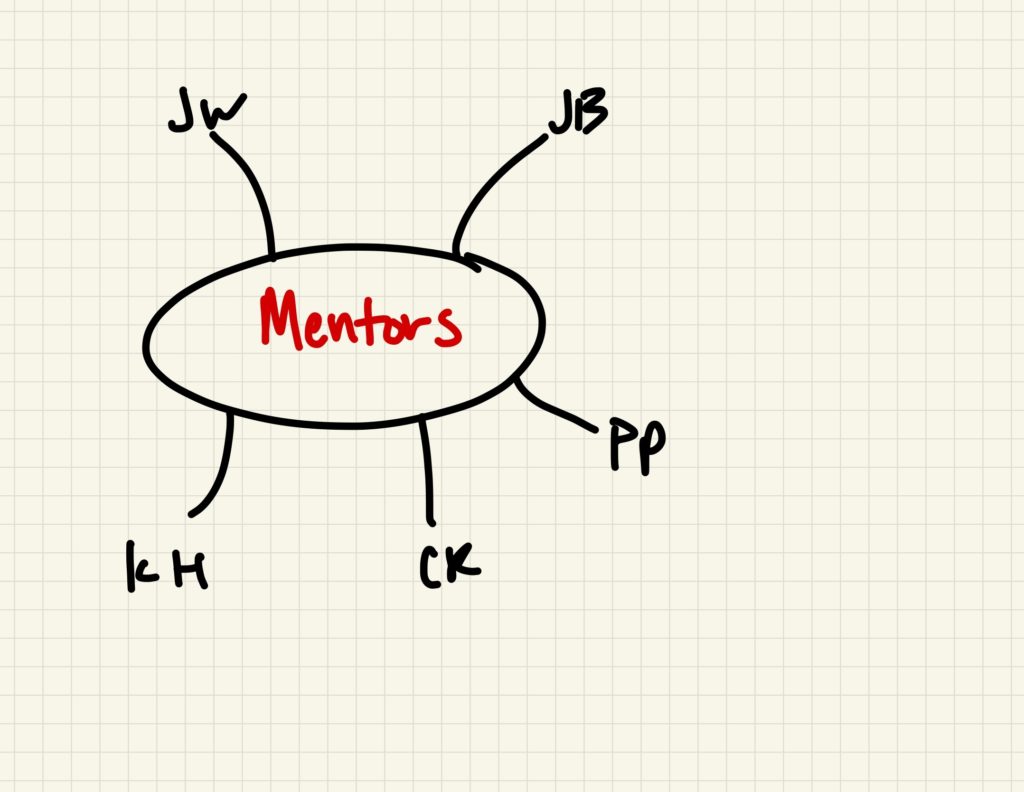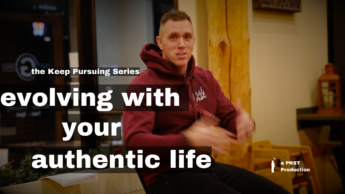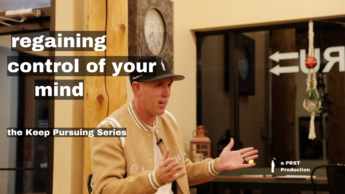This morning I wrote a post over on The Advisor Of Tomorrow about the importance of mentors for financial advisors; the reality is, good mentors are important for everyone. We often associate mentors with our professional lives but we can all use mentors in our personal lives as well–parenting, marriage, spirituality, fitness, etc. As I shared the post with my mentors, I realized that this post should also be shared here because it applies to everyone. One final comment before I let you loose…if you are a financial advisor make sure you check out The Advisor Of Tomorrow blog and newsletter–All About Your Benjamins will still have content you’ll enjoy, but The Advisor Of Tomorrow is specifically for advisors.
My journey as a financial advisor, like many other advisors, lacked a “real” training program; that’s what happens when your profession lacks a true career path. Sure, I received sales training which taught me how to position the products my employer wanted to be sold but never was taught how to be a real financial advisor. In these sales trainings, there was little time spent on the soft skills financial advisors need to help clients; most of the time was learning the ins-and-outs of products, role-playing the scripts, and listening to trainers explain how we’d help customers (I use customer and not clients because the training I received was nothing more than transactional sales training—not relationship-based, which would lead to clients).
Maybe I’m being a little harsh on the training I received. It’s possible I took away more than I realize. I did learn the sales process and as much as I don’t want to consider what we do as sales, advisors are selling—we are selling ourselves, our expertise, our client experience, and our service. Through these trainings I also learned an important lesson: I learned how I did not want to position myself with clients—this is no knock on anyone else’s relationship with clients. I learned I did not want to be a salesperson only. I learned I wanted to build lasting relationships. I learned I wanted to leave an impact on my clients’ lives not just get them into a product that may or may not fit their needs. I learned who I was being trained to be was not who I want to end up being.
For me, the training I received did not prepare me for where I knew I wanted to go and without an outlined path to take me where I wanted to go, I relied on mentors to help me along the way.
Early Mentors
Initially, the individuals I looked to as mentors were individuals I happened to personally know—none of them were financial advisors. The first was my father. I never asked him to be my mentor, but I watched him my entire life and how he interacted with others, exhibited selflessness (to a fault at times), put his family first, made personal sacrifices, and never settled for anything less than his best. Many of these characteristics translate into those of a financial advisor—and as I write this I realize more than ever that I want to work with my dad at some point, even though he is not a financial advisor. Retirement is around the corner for him and I’ll have to find a spot for him at RLS Wealth Management to keep him busy.
My other mentor was a gentleman my father introduced me to after graduated from college. He had built a very successful property and casualty insurance business and was entrepreneurial in his endeavors—-always looking ahead for the next innovative opportunity in his field. Our relationship consisted of periodic lunches where we’d just talk and I’d soak up as much as I could from him. Over time this relationship slowly fizzled as I became busier with a work schedule that did not allow for much flexibility (thanks corporate America), his children were getting older and more active in their sports, and he began to spend time down in Florida.
My first two mentors set a solid foundation for me to build upon with other mentors in the future.
The Path To Mentee
Being that I did not know any local financial advisors who I looked at and wanted to emulate, I started looking to financial advisors across the country who were in industry magazines, were writing blogs, or sending out newsletters. It was during this time I learned it is possible to find mentorship from afar and without even knowing the “mentor”. Obviously a personal relationship is ideal, but I found it possible to learn from the writings of others, to be inspired and motivated by the things I saw them doing, and to soak up every piece of knowledge they shared.
And one day the mentee-from-afar took a chance. I sent an email.
As I prepared to launch RLS Wealth Management, I emailed the advisor I followed most closely and looked up to get some advice. I fully expected no response but thought I’d try. I sent my email around 11:30 at night on a Friday. Saturday morning I woke up to an email suggesting a phone call the following Wednesday. That phone call on Wednesday was a game-changer for me. I already had the confidence I was making the right decision, but after speaking with him, I was inspired—there was no doubt I was making the right decision and was going to be massively successful.
That call was also a game-changer because it showed me there are successful individuals willing to take the time to help others succeed—maybe it’s take a phone call, or highlight a blog post, or make additional introductions. All I had to do was ask—be respectful of their time but just ask.
That call also instilled my willingness to talk to anyone who reaches out to me. If he could find time to talk to a nobody advisor in Fishers, Indiana then I will always find time to talk with anyone who asks.
This advisor did not become a mentor right away, but eventually, he would.
Current Mentors
I have five individuals (not including my father) I consider mentors, as you can see from the sketch below. Each mentor provides inspiration, motivation, education, and challenges me in different ways. I would consider myself lucky to be as successful in business and in life as these individuals. The relationship with each started much like I described above (that individual is still one of the five)—I followed each and somehow ended up connecting with them in person, on Zoom, or via phone. After the initial contact, I continued to follow their work, learning from afar, and working in periodic one-on-one time.
Here’s how each of my mentors plays a role in my life:
JB
- The advisor who made me want to start a blog and inspires me to push the envelope with content.
- Showed me its ok to put yourself out there so people can to know you.
- His firm serves as a blueprint that I customize for RLSWM.Leader at his firm and our profession.
- How to make our work enjoyable.
- Annual dinner–always my treat.
JW
- Entrepreneurship.
- He’s built multiple businesses, many which align with goals that I have. I have the opportunity to learn from his experience and to be coached as I proceed on my journey.
- Build to disrupt.
- Building and creating without sacrificing family to do so.
- Humility.
- Leader at his firm and our profession.
- How to make an impact beyond business.
- Be professional with good style.
KH
- Entrepreneurship.
- He has created the life he wants for his family and it involves a very entrepreneurial spirit and life.
- How to keep business from overwhelming family life–work-life balance.
- Align your values with your work.
- How to have fun with work.
- Be generous with time and “giving away” knowledge.
- Organization.
CR
- Exhibits the true heart of an advisor.
- Shows how to lead with emotion.
- Compassion.
- Leader within our profession.
- How to inspire other financial advisors to strive to be better.
- How to genuinely take an interest in others.
PP
- Content creator.
- Shares a very similar outlook on life and what’s important than I do.
- I view talking with him as a chance to see how my mindset and mentality can impact decisions.
- Open to share his experiences and lessons learned.
- Inspires my creativity.
Advice For Mentees
For those of you looking for a mentor, I want to stress that a mentorship does not need to be a relationship where you spend each day with your mentor; I think of traditional mentorship at firms where you are assigned an older advisor who is supposed to show you the ropes. There’s no doubt these mentorships can prove to be invaluable, but the likelihood you find the ability to spend each day with your mentor is slim. Especially if you are in a situation like I was in where your mentor is not even in your city.
I also wanted to stress that you don’t need a formal “mentorship” process or announcement. I have told each of my mentors how much I appreciate them, what their time means to me, and how they have and continue to help me grow. But I think I’ve only actually told (didn’t even ask) two that they are mentors to me. You can certainly ask someone to be your mentor and I definitely encourage you to do so, but don’t get discouraged if they cannot commit because with a phone call or Zoom every once and a while, some emails or texts, and reading the work of your mentor you can get everything you need to learn from your mentor.
My final piece of advice is to be respectful of your mentor’s time. You will definitely want more of your mentor’s time than you will get, but you have to respect they have businesses to run, clients to work with, employees to help, and a laundry list of responsibilities. So try to limit your asks and maximize the time you get with them and find ways to provide value to them. Providing value to my mentors was something I was afraid I could never do—how can I reciprocate the massive amount of value they provide to me? I’ve sent books, shirts, a cartoon character toy, and thank you notes as little tokens of appreciation. I’ve paid for meals and coffees. I’ve tried to find every opportunity to do something FOR my mentors because of how they have impacted my life. I’ve also learned that you will provide value to your mentors in ways you’d never expect…you’ll be surprised how these relationships can become two-way streets.
My business and my life would look a lot different if it were not for the mentors I have (and have had) in my life. Finding strong mentors is an important component of growth—you cannot know or learn everything on your own.
Disclaimer: Nothing on this blog should be considered advice, or recommendations. If you have questions pertaining to your individual situation you should consult your financial advisor. For all of the disclaimers, please see my disclaimers page.





4 thoughts on “The Importance Of Mentors (From The Advisor Of Tomorrow)”
Comments are closed.